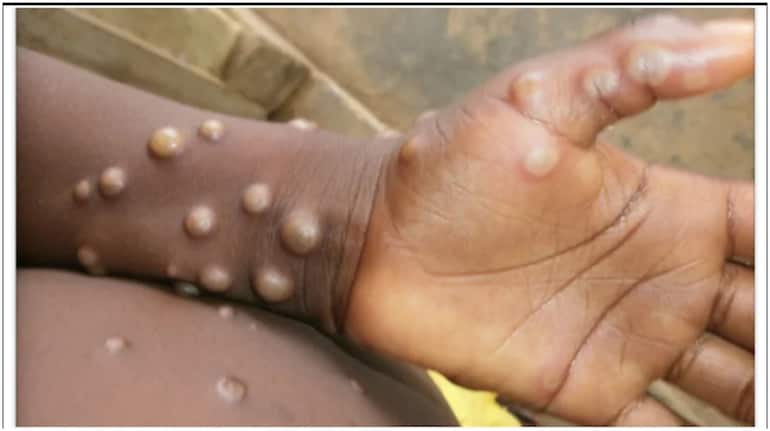Exotic Viruses Leaving Home
"We do not have to panic. It [Monkeypox] is not something you can acquire in a grocery store or on public transportation.""We have to do a complete investigation to understand all the links in the chain.""What we are worried about is prolonged close contact, and it could happen in any kind of setting."Dr.Mylene Drouin, Montreal director of Public health"I am a little concerned that we are hearing about a lot of it [Monkeypox being discovered in countries around the world] here and there in other countries."Earl Brown, virologist, University of Ottawa
 |
| Child with lesions from monkeypox, courtesy CDC archive |
Suddenly a new virus raises its unappealing head as it travels the world from its home in Central and West Africa. Monkeypox was first identified in 1958 and has fairly well remained in place where it was first discovered to have emerged. The virus appears to be a cousin, so to speak, of smallpox. Now, just recently, cases of Monkeypox have been seen in Belgium, France, Germany, Italy,the Netherlands, Portugal, Spain, Sweden, the United Kingdom, the United States, Canada and Australia. It has travelled far and it is travelling fairly quickly.
Clusters are being picked up here and there, and in Montreal, public health officials were confirmed to be looking into 17 possible cases. Not good news; on the other hand, the medical community is urging the public not to be too concerned. Medical authorities across Canada are now alert to cases that include certain identifying characteristics: fever, headache, muscle aches and exhaustion, all symptoms common to a whole host of other conditions. None of which, however, bear the symptoms of a distinctive rash and painful lesions appearing often on the palms of hands.
The cases suspected of being Monkeypox, but awaiting verification have been occurring among men between the ages of 30 and 55. And they are men further characterized as those who have sex with other men, explained Dr.Drouin. Some of these cases have been seen with oral and genital lesions, but none yet confirmed through laboratory testing, and nor do they represent severe cases. While they are linked to sex networks, being detected in clinics treating sexually transmitted diseases, health officials deny that Monkeypox is transmitted sexually.
It is spread through close contact and droplets. No connection has been established between the SARS-CoV-2 pandemic and the newly revealed spread of Monkeypox. In Africa where the virus' presence is more common, it is rodents that act as reservoirs. Monkeypox re-emerged in Nigeria in 2017, after over 40 years with no reported cases. Over 450 reported cases have erupted since then; eight thought to have been exported internationally.
"This is the first time in modern human history where we have so many people who have never been exposed to a pox virus and have never been vaccinated against smallpox.""Perhaps what the teaching point of this is, the public is going to have to become scientifically and more microbiologically literate in understanding that with climate change, with very rapid international travel, with ignoring basic health recommendations, we will see one kind of outbreak after another."Dr. Gregory Poland, head, Mayo Clinic's Vaccine Research Group
 |
Monkeypox often starts with flu-like symptoms before causing a chickenpox-like rash on the face and body. |
Health authorities have been alerted to an unusual number of cases internationally reported in recent weeks leading to questions of whether human-to-human transmission has undergone a change. Whether viral illness is different than it has been in the past; whether its proximity to the COVID pandemic may be a factor in its presence. A suspicion that perhaps the presence of COVID has increased susceptibility in some people transmitting it to other victims.
In the United Kingdom a program has been initiated to vaccinate close contacts of cases, along with health workers, with smallpox vaccine.Two known strains of Monkeypox have been identified; the Congo strain, with a ten percent case fatality and the West African strain, with a one percent case fatality rate. A sobering statistic. The less virulent strain is being seen in the international outbreak.
According to Ottawa virologist Earl Brown, there is a likelihood that people immunized against smallpox would have a level of protection against Monkeypox. Before the 1970s, smallpox vaccine was regularly administered to schoolchildren in Canada, until smallpox was eradicated in 1981.
"Monkeypox is in the same family of virus as smallpox, but it should not be confused with smallpox in levels of alarm.""With smallpox, 10% to 30% of people can die. With this strain of Monkeypox that is circulating right now, that death rate in Africa is 1% or less."Dr. Gregory Poland, head, Mayo Clinic's Vaccine Research Group
Labels: Central Africa, International Clusters, Monkeypox, Virology

0 Comments:
Post a Comment
<< Home